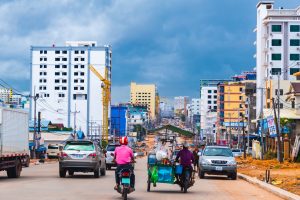Cambodia’s troubles with human trafficking have escalated significantly after investigations by Taiwanese authorities, who fear thousands of Taiwanese have been trafficked into the Southeast Asian country and forced to work for criminal syndicates.
Amid harrowing reports from trafficked victims, the National Police Agency (NPA) conducted an investigation based on flight records, revealing that about 1,000 Taiwanese travelled to Cambodia per month for much of this year but on average only 100 returned home.
Based on that, police and politicians say at least 2,000 Taiwanese are still stranded in Cambodia against their will, but this number could be as high as 5,000 because of blind spots in the data. That is significantly more than the previous estimates that hundreds of Asians had been reportedly tricked and then sold here.
An inter-ministerial task force has been set up to deal with trafficked Taiwanese and there have already been press conferences with victims who escaped. A similar pattern emerged in Malaysia in April when its ambassador in Phnom Penh wrote to local police seeking help.
In March, a group of 35 organizations told the Cambodian government to urgently address “a crisis of forced labor, slavery and torture” after warnings were issued by five Asian embassies; Indonesia, Vietnam, Thailand, Pakistan, and China. Malaysia followed soon after.
“Dozens of media reports and numerous victim accounts collected by local and international organizations suggest that thousands of people, mostly foreign nationals, are entrapped in these situations,” they said, bluntly, five months ago.
These types of operations – based mainly in the notoriously lawless southern port town of Sihanoukville – are similar to “boiler rooms,” which were not uncommon in Cambodia 10 to 20 years ago when Westerners were far more prominent in this country.
Back then boiler rooms were typically run by English-speaking Europeans who recruited from the ranks of backpackers and unsavory elements in the expat community who would target the wealthy and retired in the West with dodgy investments.
Foreign currencies, stock markets, and retirement villages were touted as investment strategies from offices with dozens of fixed telephone lines by people who made a conscious decision to work this nefarious trade and take a punt on fleecing the elderly of their savings.
The difference between then and now is today’s operations are being run mainly by Chinese syndicates who trick unwitting Mandarin speakers, among others, into this type of scam with false promises of high pay. They are kidnapped on arrival and held in fortified compounds.
And these operations are nasty. Beatings and torture by electrocution are common, according to victim accounts. People are held in third or fourth floor rooms. Some jump and, obviously, injure themselves. They have been ransomed, with families expected to pay thousands of dollars for their release. Many are sold onward.
Pip, a nickname, told Focus Taiwan that she applied for a high-paying job in Cambodia, but after arriving she was imprisoned in an industrial compound and resold four times in seven days. She escaped with help from a Cambodian provincial governor and an anti-fraud organization.
Like the boiler rooms of old, most of the scams involve investment fraud, but romance scams, online gambling, and cryptocurrencies have emerged as additional, lucrative sidelines. Each person is given a target to meet, often with a wealthy mainland Chinese in the crosshairs.
The type of people being trafficked is also starkly different from the common stereotype of poor, young villagers being sold into sexual slavery or press-ganged onto a fishing trawler, with little or no redress or a support network back home.
These trafficked people are young – some are kids – but they are also generally smart, educated, tech-savvy, and come from the aspiring middle classes. They have family and friends who miss them and have the ways and means of complaining and being heard by the authorities in their home countries.
But they share a common desire to make more money and a youthful arrogance that passes for naivety when confronted by an offer too good to pass up, a recipe which criminal elements are always quick to take advantage of.
It’s an enormous problem that rests with the authorities in Cambodia.
Indonesians, Vietnamese, Thais, and Malaysians have been rescued in Sihanoukville by the hundreds. But the numbers coming out of Taiwan would suggest that the problem is much greater than the authorities in Cambodia wish to believe.
That also helps explains why the U.S. State Department recently dropped Cambodia, alongside Vietnam and Brunei, to Tier 3 – the lowest level – in its annual human trafficking report, a sore point with Phnom Penh which was apparently “shocked” by the decision.

































